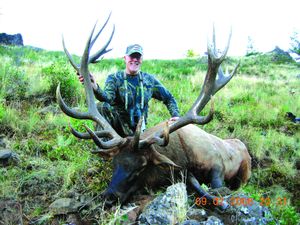5 reasons for hunters to score their big-game trophy
HUNTING -- Congratulations! You finally killed that trophy specimen that eluded you for many seasons and countless hunts. You made celebratory stops at your buddy’s house and then the local meat processor. The taxidermist is next. But, unlike your previous hunts, this time there’s another consideration—entering your trophy into the Boone and Crockett Club’s records book.
The Boone and Crockett Club records program is the only North American harvest data system that collects information on all species of free-ranging native North American big game taken in fair chase.
Getting listed in the world’s most distinguished hunting-records book involves official measuring, paperwork and a $40 processing fee, all detailed at www.boone-crockett.org, but the rewards are considerable.
Read on for the club's top five reasons to enter a trophy in "the book."
1. Archiving Conservation History
Under the leadership of Boone and Crockett Club founder Theodore Roosevelt, the Club’s system of scoring big-game trophies originated in 1906 (official records date back to 1830) as a means of recording details on species thought to be disappearing due to rampant habitat loss and unregulated hunting. Science-based conservation efforts, led and funded by license-buying hunters, brought those species from vanishing to flourishing. Boone and Crockett trophies are a gauge of conservation success as well as the ongoing need for habitat and wildlife stewardship.
2. Improving Future Management
Because they represent fully mature specimens, Boone and Crockett records are an important indicator of the age structure and breeding fitness of a herd, as well as an indicator of habitat quality. For biologists and professional wildlife managers, the presence and production of trophy animals suggests optimum overall herd health; their absence may suggest that refined management strategies are warranted. Records build a timeline of both positive and negative trends in conservation practices and are used to chart future actions.
3. Honoring the Animal
Outstanding trophies produced naturally deserve to be recorded and respected, as do the habitats that produced them, in the most prestigious annals of big game hunting.
4. Discrediting Hunting’s Critics
Those who oppose hunting often claim that hunting reverses natural selection, because unlike wild predators, human hunters often seek out the largest specimens. However, Boone and Crockett Club trophy entries have increased 400 percent over the past 30 years, which means trophy-class animals actually may be more plentiful now than ever before. This single statistic is an ongoing tribute to the professionals who manage wildlife and the hunters who participate in that management.
5. Establishing Official Bragging Rights
Less than one percent of all sportsmen will take a Boone and Crockett-qualifying trophy in their lifetime. An accepted entry absolutely signifies the highest accomplishment in big game hunting—the legal, ethical, fair-chase harvest of a free ranging specimen that stands as an ultimate representation of its species. World-class trophy mounts are celebrated and passed down from one generation to the next. Over time, the story boils down to how that remarkable animal got there in the first place—through the efforts of sportsmen!

